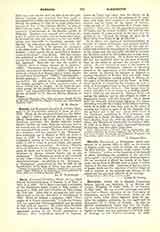

Barre, ANTOINE-LEFEBVRE, SIEUR DE LA, tenth French Governor-General of Canada, b. at Paris in 1622; d. in 1690. De la Barre was made a counsellor of the Parlement (High Court) in 1646, master of requests in 1653, and was Intendant of Paris during the civil war. After this he successively held other offices until he became Intendant of Bourbonnais in 1663. There he formed a company called “Cornpagnie de la France equinoxiale” to colonize Guiana, and was appointed lieutenant-general and governor of that part of America. He sailed from Rochelle in 1664 with the Marquis de Tracy, who had been appointed viceroy of the French possessions in America. After establishing himself at Cayenne, which de Tracy had taken from the Dutch, de la Barre returned to France in the autumn of the same year, and while there published an account of his mission and his hopes for the future of Guiana, under the title of “La Description de la France equinoxiale”. Soon after, he was appointed commander of Guiana and the French Antilles. In 1671 he was made captain of a man-of-war; in the same year he published the “Journal du voyage du sieur de la Barre en la terre ferme et fie de Cayenne”.
De la Barre was appointed Governor-General of Canada to replace Frontenac, and reached Quebec early in October 1682. He received wise and detailed instructions for his guidance in the government of the colony and was especially directed to prevent the disorders caused by the traders and to keep them from fraudulent practices. De la Barre was already old and was animated more by the love of money than by the desire to advance the interests of the colony. He was induced by some of the traders to join in various enterprises. Instead of devoting himself to the organization of the internal affairs of the colony he allowed his advisers to dispatch a trading expedition to Hudson Bay and aided them in sending clandestine trading parties to Albany, to the region of the Mississippi, and the West. In 1684, under pretext of overawing the Iroquois, he took a body of ill-equipped troops as far as Fort Frontenac at the head of Lake Ontario. The troops were in reality intended to be an escort to a trading expedition in which he was interested. Sickness broke out among his soldiers, and he was obliged to make a disgraceful treaty with the Iroquois. De la Barre gave the Iroquois unrestricted rights in the region extending towards the country of the Illinois Indians, which de la Salle at that time was on the point of winning for France in spite of all the obstacles that the governor put in his way. Louis XIV heard of the disastrous expedition to Fort Frontenac and recalled do la Barre (March 10, 1685), who did not leave Quebec, however, until the arrival of his successor, the Marquis de Denonville, in October, 1685. In 1687 de la Barre was again appointed Governor of Cayenne and died three years later.
J. EDMOND ROY

